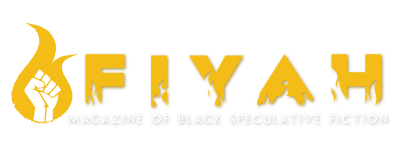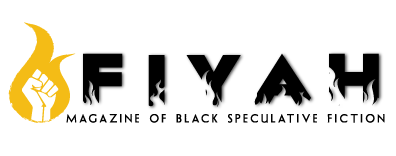
FIYAH: Welcome to our first Black History Month here at FIYAH. As part of our celebration of this illustrious time of year, we are interviewing black SFF writers from across the globe. For our first author, we will be talking to Tade Thompson. He’s an award winning writer and on the cutting edge of African SFF. We’re extremely happy to have him here.
Tade: Hi! Thanks for having me. I’m honoured 🙂
FIYAH: Right off the bat, you’re obviously a very accomplished writer. What would you say to writer struggling to find their voice?
Tade: Stop trying.
Your voice is uniquely yours. It’s from your DNA, your education, your first love, the first time you got punched, your quirks, the way you drive people crazy, the things you do that your friends love, the way you react to alcohol or puppies, and so on. These are not things you can force.
If you examine the metaphor, your speaking voices is unique without effort. Why should your writing voice be any different?
Voice will come on its own. The writer’s job is to keep writing. I guarantee that if you put in the hours, voice will come.
I’d argue that voice is present, even from your first bit of writing. It is our efforts to be a Writer that strangles the voice. So, stop struggling. Stop trying.
FIYAH: Heed the advice folks, the man knows what he’s talking about. What was the best writing advice that anyone ever gave you?
Tade: That in the real world, outside writing for friends or in your writing group, the reader doesn’t care about you. It is your job to seize the attention of the reader from their smart phone, and keep hold of it until they either finish the narrative, or don’t stop thinking about the story until they’ve finished the essential thing they had to do (like cook food, attend lectures, work) so they rush back and keep reading. It’s nothing personal. Modern living places a premium on attention and you have got to give people a good reason to let something else go. Go outside, and actually look at people. They are taking a walk, talking with friends, binge-watching some formulaic show, locked on their phones, mind-melded with a lover, watching some televised music . That is what you’re competing with. So that lukewarm paragraph you churned out just won’t do it. You have to bring your A-game every time because it may be the first and last opportunity to make any particular reader care. Discard shit that doesn’t grab people by the lapel. Can I swear? 🙂
FIYAH: Swearing is absolutely permissible. You have a lot to offer in terms of craft and writing advice. What are some of the reference materials you use and how do you engage with them?
Tade: First, I believe that reference materials will differ for different writers. I advocate checking out books from the library and seeing if they suit you, then going with them while discarding the ones that don’t work. Because people are different, we often require different combinations of words to get the same advice across.
Here are the books I would recommend, but only for me! You can’t be dogmatic about these things.
- Wonderbook by Jeff Vandermeer: if you want to write fantastical fiction, you really can’t go wrong with this.
- Revising Fiction by David Madden: this is out of print, but there are copies on Amazon and ebay. I consider this my most valuable book for revising.
- The Oxford American Writer’s Thesaurus, 3rd edition. Very important for elegant variation of your phrases. (or Rodale, or Roget’s)
- A good usage dictionary, either Fowler’s (UK) or Garner’s (American).
- A big-ass dictionary.
- The Elements of Style by Strunk and White, Fourth edition.
- Eats, Shoots & Leaves by Truss. Punctuation guide.
These seven are a starter-pack. Even if you want or find different books more useful, they should have this configuration.
The easiest to explain are the dictionary, usage dictionary and thesaurus. If you plan to write you have to have a bank of words available to you, and be proficient in their use. You have to have alternatives so that your narrative doesn’t come across as repetitive. You, writer, must know and love words. These books are your friends.
You need a punctuation guide. You don’t have to be perfect, but your text has to be understandable. Truss’s book is short and straightforward.
Elements of Style is a short book that you can read in an hour, but that you will go back to again and again. Not all the advice is sound (for example, “avoid foreign languages”. I mean, come on, dude, I have to put that Yoruba or Igbo phrase in my work) but the first version was in 1935, so we can forgive some insensitivity.
Revising Fiction is a manual. It does what it says on the tin. For a long time I had no idea what revising meant (hah! I can hear my editor saying, “you still don’t!”), and this book laid it out for me in plain language. It may not be for everybody, but it’s one book that I would save if there was a fire (no, kids, evacuate the building if there’s a fire. Do not stop to save your books!).
Wonderbook is a bit of everything, but with an emphasis on sci-fi/fantasy. Fully illustrated, playful, great essays by Karen Lord, Neil Gaiman, etc., real, useful advice.
Does that work? Is that what you meant by engage with them?
FIYAH: I think you clarified the question and then some. That’s alot of knowledge for anyone to partake in. So when was the moment when you decided to fully pursue professional writing?
Tade: There was no moment. I’ve been writing since I was a kid. At this point I don’t think of it as pursuing professional writing in the sense of getting paid, although I don’t think writers should work for free (on that, I think keep writing and improving until someone will pay you for your efforts. Later for that contributor copy/exposure nonsense). That said, I didn’t seek publication of any kind until 2000 or so. I had lots of other things going on in my life, so I could only dedicate short bursts of time to writing and improving craft.
I’ll say this: the decision to write regularly, to the best of my ability, AND to get paid was circa 2004. “Fully”, on the other hand, is not possible with my current life circumstances. Maybe it’s in the future, but I have other passions.
FIYAH: Other passions huh? Care to share? And do any of them play into your writing at all?
Tade: I’m an amateur visual artist. I only use physical materials and never digital. I like drawing and painting with oil and acrylic, although I love India ink and sometimes water colour. I’m constantly trying to improve, but the amount of time is finite.
I also love anthropology and martial arts, all of which require their own time. The upshot is that I’m seldom bored.
I tend to approach writing like an artist. So to paint you first of all need one or several studies, that is, sketchy work that helps you work out the composition, values, colour etc. Then you have an underpainting or underdrawing, then the main painting. That’s how I write. The studies are the various drafts I go through.
FIYAH: Speaking of inspired writing, what moved the creation of ROSEWATER?
Tade: Deep thought about alien invasions as portrayed in books and films over a number of years. The invasion narratives just seemed like thinly-veiled human invasions of each other, like colonialism. I wanted to go beyond that, so I kept asking “why would aliens come here?”, and I kept asking until I had a coherent narrative.
FIYAH: With narratives in mind, what book do you currently have on your bookshelf that’s demanding you to read it?
Tade: Underground Railroad by Coulson Whitehead. I also want to re-read A Brief History of Seven Killings by Malon James because that book is a masterclass in fiction. The first reading is pleasure, the second is close reading for craft improvement.
FIYAH: How do you feel your writing career changed after winning the Golden Tentacle?
Tade: There’s a Zen saying: “Before enlightenment, chop wood, carry water; after enlightenment, chop wood, carry water.”
The answer is no change whatsoever (except I can now say, “award-winning”). My aim is to write memorable prose. I want to write words that people will talk about in years to come. I’m working for that, towards that. I’m chopping the wood and carrying the water. The Kitschies did make me realise that perhaps what I’m doing is working, that my prose is not repugnant (or rather, it’s repugnant when I want it to be 🙂 ) It’s more like a “keep going” thing. It’s validating, sure, but that can be fleeting. As a writer, you’ll have days when you think you’re just screaming into a void, and winning awards can ease that, but ultimately, you have to depend on elbow grease. Work, work, work, craft, craft, craft. There is no other way.
FIYAH: When writing, do you have multiple WIPs you’re working on simultaneously or do you tackle it one by one?
Tade: Always multiple, but usually there is one main one. I use the others when I’m flagging.
FIYAH: Speaking of WIPs, what are you working on? What are hoping we get to see from you in the future?
Tade: I’m working on a novella called Witch Gun Running which is a fantasy based loosely on a West African belief system, with giants, sentient trees, cannibalistic cave-dwelling mer-people and “witches”.
The next work you’ll see form me will be an essay on Neil Gaiman’s Sandman, a short story called Bootblack about race riots and time travel in Wales after WW 1 (in Expanded Horizons), a novella called The Murders of Molly Southbourne (Tor.com circa October 2017). There’s other stuff, but I can’t talk about them yet.
We want to thank Tade for taking the time out to speak with us today. He’s a stand-up guy and an excellent writer. His seven-book starter pack already has us salivating! Be sure to check out his latest work ROSEWATER!


